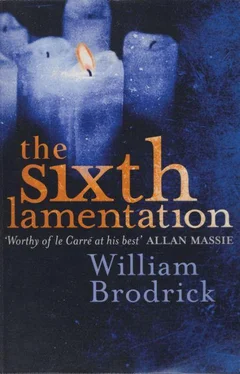William Brodrick - The Sixth Lamentation
Здесь есть возможность читать онлайн «William Brodrick - The Sixth Lamentation» весь текст электронной книги совершенно бесплатно (целиком полную версию без сокращений). В некоторых случаях можно слушать аудио, скачать через торрент в формате fb2 и присутствует краткое содержание. Жанр: Триллер, на английском языке. Описание произведения, (предисловие) а так же отзывы посетителей доступны на портале библиотеки ЛибКат.
- Название:The Sixth Lamentation
- Автор:
- Жанр:
- Год:неизвестен
- ISBN:нет данных
- Рейтинг книги:5 / 5. Голосов: 1
-
Избранное:Добавить в избранное
- Отзывы:
-
Ваша оценка:
- 100
- 1
- 2
- 3
- 4
- 5
The Sixth Lamentation: краткое содержание, описание и аннотация
Предлагаем к чтению аннотацию, описание, краткое содержание или предисловие (зависит от того, что написал сам автор книги «The Sixth Lamentation»). Если вы не нашли необходимую информацию о книге — напишите в комментариях, мы постараемся отыскать её.
The Sixth Lamentation — читать онлайн бесплатно полную книгу (весь текст) целиком
Ниже представлен текст книги, разбитый по страницам. Система сохранения места последней прочитанной страницы, позволяет с удобством читать онлайн бесплатно книгу «The Sixth Lamentation», без необходимости каждый раз заново искать на чём Вы остановились. Поставьте закладку, и сможете в любой момент перейти на страницу, на которой закончили чтение.
Интервал:
Закладка:
William Brodrick
The Sixth Lamentation
‘L’Occupation’
April’s tiny hands once captured Paris,
As you once captured me: infant Trojan
Fingers gently peeled away my resistance
To your charms. It was an epiphany;
I saw waving palms, rising dust, and yes,
I even heard the stones cry out your name,
Agnes.
And then the light fell short.
I made a pact with the Devil when the
‘Spring Wind’ came, when Priam’s son lay bleeding
On the ground. As morning broke the scattered
Stones whispered ‘God, what have you done?’ and yes,
I betrayed you both. Can you forgive me,
Agnes?
(August, 1942)
Translated from the French by Father Anselm Duffy,Feast of Saint Agnes,Larkwood Priory, 21st January 1998Part One
‘Now is the time for the burning of the leaves’
(Laurence Binyon, The Burning of the Leaves’, 1942)First Prologue
1
April 1995.
“‘Night and day I’ve lived among the tombs, cutting myself on stones”,’ replied Agnes quietly, searching her memory.
Doctor Scott’s eyes narrowed slightly. His East Lothian vowels had lilted over diagnosis and prognosis, gently breaking the news while Agnes gazed at a gleaming spring daffodil behind his head, rising alone from a rogue plant pot balanced on a shelf — a present from a patient, perhaps, or free with lots of petrol. Soon it would topple and fall.
She forgot the flower when those old words, unbidden, rumbled from her mouth. Agnes couldn’t place where they came from. Was it something Father Rochet had said, worse for wear, back in the forties? Something she’d read? It didn’t matter. They were hers now, coming like a gift to name the past: an autobiography.
Agnes glanced at her doctor. He was a nice fellow, at home with neurological catastrophe but less sure of himself with mangled quotation. He looked over-troubled on her account and she was touched by his confusion.
‘Do you mean to tell me that, after all I’ve been through, I’m going to die from a disease whose patron is the Duchess of York?’
‘I’m afraid so.
‘That’s not fair, Doctor.’ Agnes rose from her seat, still wearing her coat and holding her handbag.
‘Let me get you a taxi.’
‘No, no, I’d rather walk, thank you. While I can.’
‘Of course.’
He followed Agnes to the door and, turning, she said, ‘I’m not ready yet, Doctor.’
‘No, I’m sure you’re not. But who ever is?’
Agnes breathed in deeply A sudden unexpected relief turned her stomach, rising then sinking away She closed her eyes. Now she could go home, for good, to Arthur — and, funnily enough, to the knights of The Round Table. She’d never noticed that before.
Agnes had known there was something wrong when her speech became trapped in a slow drawl as if she’d had too much gin. She let it be. And then she started tripping in the street. She let that be. Like so many times before, Agnes only acted when pushed. She’d made an appointment to see a doctor only after Freddie had snapped.
They were walking through Cavendish Square towards the Wigmore Hall. A fine spray of March rain floated out of the night, softly lit from high windows and streetlamps. Freddie was a few impatient steps ahead and Agnes, trying to keep up, stumbled and fell, cutting her nose and splintering her glasses. Tears welled as she reached for her frames, not from pain, but because she knew Freddie’s embarrassment was greater than hers.
‘Mother, get up, please. Are you all right?’
Agnes pulled herself to her feet, helped by a passer-by. She wiped her hands upon her coat as Freddie produced a neatly folded handkerchief. His exasperation spilled over. ‘Look, if something’s wrong, see a doctor. You won’t say anything to me. Perhaps you’ll say something to him. But for God’s sake,’ he blurted out, ‘stop this bloody performance.’
Agnes knew he would berate himself for hurting her, as she berated herself for failing him. Neither of them spoke again, save to put in place essential courtesies.
‘No, you first, really.’
‘Thank you, Freddie.’
‘A programme?’
‘I don’t think so.’
Agnes felt unaccountably tired by the interval so he took her home. She saw Doctor Scott within the week and he made the referral. She saw a consultant. The results came back. Doctor Scott had given her a call, and now she knew
Leaving the doctor to a mother of five, Agnes ambled to her beloved home by the Thames where tall houses were cut from their gardens by a lane that ran to Hogarth’s tomb. Here was her refuge, among brindled masonry and odd round windows with the copper glint of light on old glass. On the way she passed a troop of children holding hands and singing, the teachers front and back armed with clipboards. Piercing voices dislodged stones in her memory, stirring sediment. Frowning heavily, she thought again of Madame Klein and Father Rochet, Jacques and Victor and Paris and… all that.
No green shoots of forgetfulness had grown. The memory remained freshly cut, known only to Arthur. And now she was to die, without any resolution of the past, with no memorial to the others. But how could it be otherwise?
Turning the corner past the newsagent, she came into view of the river. The breeze played upon the water, tousling a small boy pulling oars out of time. She slowed, caught short by the resilient disappointment that always struck like a sudden cramp when Agnes paid homage to brute circumstance.
‘Loose ends are only tied up in books,’ she said quietly, and she pushed aside, probably for the last time, the lingering, irrational hope that her life might yet be repaired by a caring author. Agnes stopped and laughed. She turned, walked back to the newsagent, and bought two school notebooks.
2
Freddie and Susan drove over from Kensington that evening, and Lucy took the tube from Brixton.
It was like a set piece of bad theatre: Freddie standing by the bay window, Susan fiddling with the kettle flex and Lucy, their daughter, the unacknowledged go-between, sitting slightly tensed in an armchair opposite Agnes, who was reluctantly centre stage.
‘It’s called motor neurone disease. ‘
No one said anything immediately Freddie continued to avert his eyes. Lucy watched her mother keeping still, the flex suspended in her hands.
‘Gran, did he say anything else?’ Lucy asked tentatively.
‘Yes. He expects it to advance on the quick side. At some point I won’t be able to walk or talk, but I never did…’
Freddie walked across the room and knelt by Agnes’ chair. He put his head on her lap and Agnes, a mother again, stroked his hair. Susan cried. Agnes wasn’t sure if it was for her or the sight of Freddie undone. It didn’t matter. Agnes continued ‘… I never did say much anyway, did I?’
After a cup of tea, Freddie and Susan left. There’d been a surprising ease between them all and Freddie had said he’d come back tomorrow night. It felt like a family Lucy stayed on.
Joined by familiar silence, they sat at the scrubbed kitchen table preparing a mound of green beans, nipping the tips between their nails. Eight minutes later they curled up with bowls upon their knees, sucking butter from the prongs of their forks.
Agnes didn’t watch television very often but she did that night. After Lucy had left she waited with the volume off for something interesting to appear. Images flickered on the screen, throwing stark shadows across the walls, lighting her face and blacking it out.
The telephone rang. It was Lucy, checking up on her. As she put the receiver down, Agnes’ attention was suddenly seized by a grainy black and white newsreel of those elegant avenues she’d known so well, the slender trees and the sweep of the river. It was Paris before the war, almost sixty years ago.
Читать дальшеИнтервал:
Закладка:
Похожие книги на «The Sixth Lamentation»
Представляем Вашему вниманию похожие книги на «The Sixth Lamentation» списком для выбора. Мы отобрали схожую по названию и смыслу литературу в надежде предоставить читателям больше вариантов отыскать новые, интересные, ещё непрочитанные произведения.
Обсуждение, отзывы о книге «The Sixth Lamentation» и просто собственные мнения читателей. Оставьте ваши комментарии, напишите, что Вы думаете о произведении, его смысле или главных героях. Укажите что конкретно понравилось, а что нет, и почему Вы так считаете.












